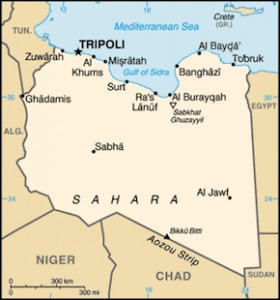Libya’s first election in six decades reportedly had a high voter turnout, but the day was plagued by still-formed rebel militias committing acts of violence and sabotage and preventing over 100 polling stations from opening.
 There have been reports of protesters storming a few polling stations in the eastern city of Benghazi and in the eastern town of Rad Lanuf, militias prevented voters from voting. Libyan officials claim that 94 percent of polling stations opened without issue.
There have been reports of protesters storming a few polling stations in the eastern city of Benghazi and in the eastern town of Rad Lanuf, militias prevented voters from voting. Libyan officials claim that 94 percent of polling stations opened without issue.
According to the Associated Press, there are about 3,700 candidates seeking election in Libya’s future government, including 585 women. The main parties include the “Muslim Brotherhood (Islamists), Al-Watan (Salafis and other Islamists), Alliance of National Forces (secular), National Front (veteran opposition to Gadhafi), National Centrist (former Finance Minister Ali Tarhouni).”
Results are expected within a week of the voting. Following that a new Assembly is supposed to appoint a Cabinet within 30 days and then a second election for a 60-member body to write a new constitution.
Many in the Western media have been hailing today as an historic day for democracy. But post-NATO Libya is far from a success story. And as Dan Murphy at the Christian Science Monitor writes, “an election by itself means very little, and is certainly no guarantee against horror and chaos in the near future.”
“Iraq’s first free election in history in January of 2005,” Murphy writes, “came as it descended into a civil war that reshaped the demographics of the country and left hundreds of thousands dead in its wake. That country’s ancient Christian population is a fraction of what it was in 2003, and the Islamist government of Prime Minister Nouri al-Maliki has taken on an increasingly authoritarian cast.”


